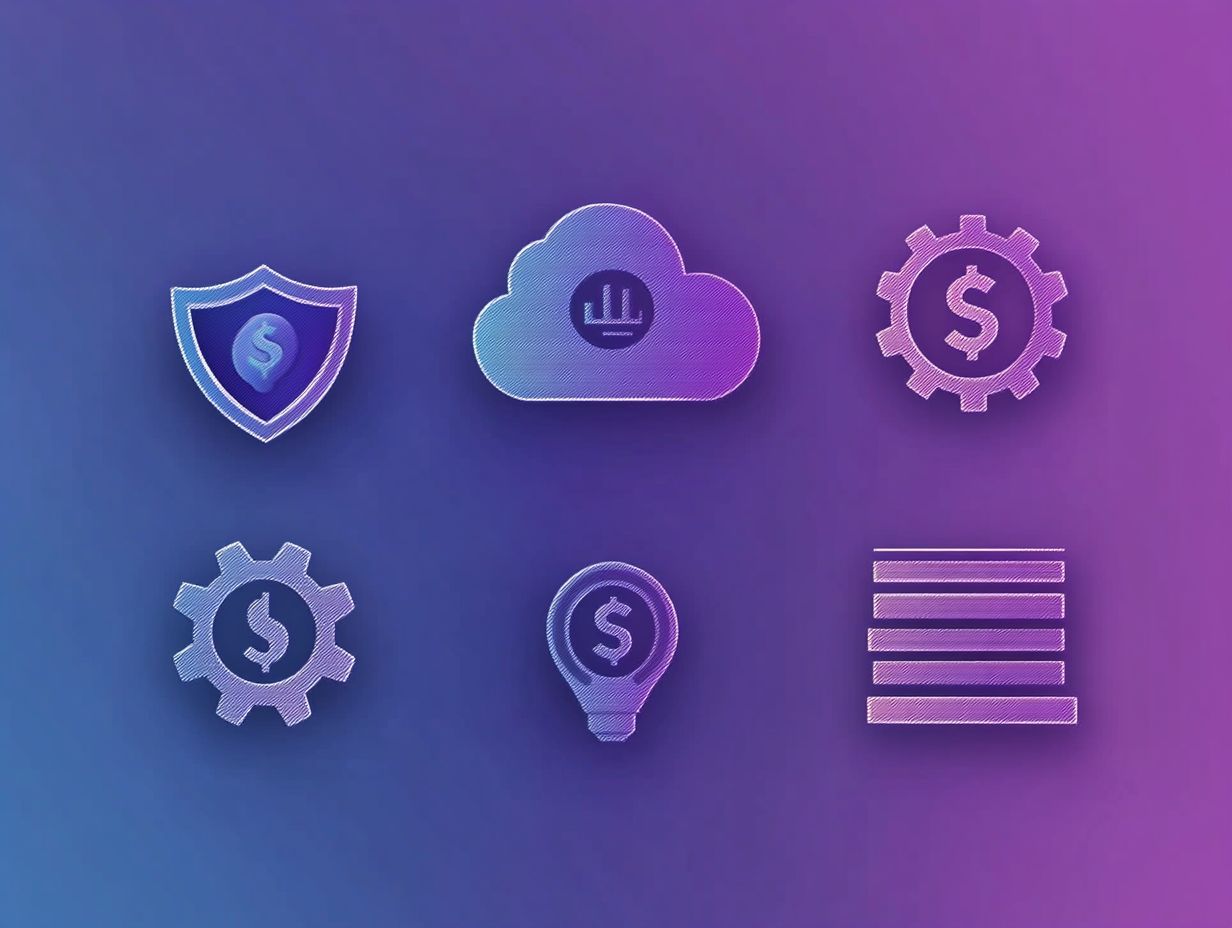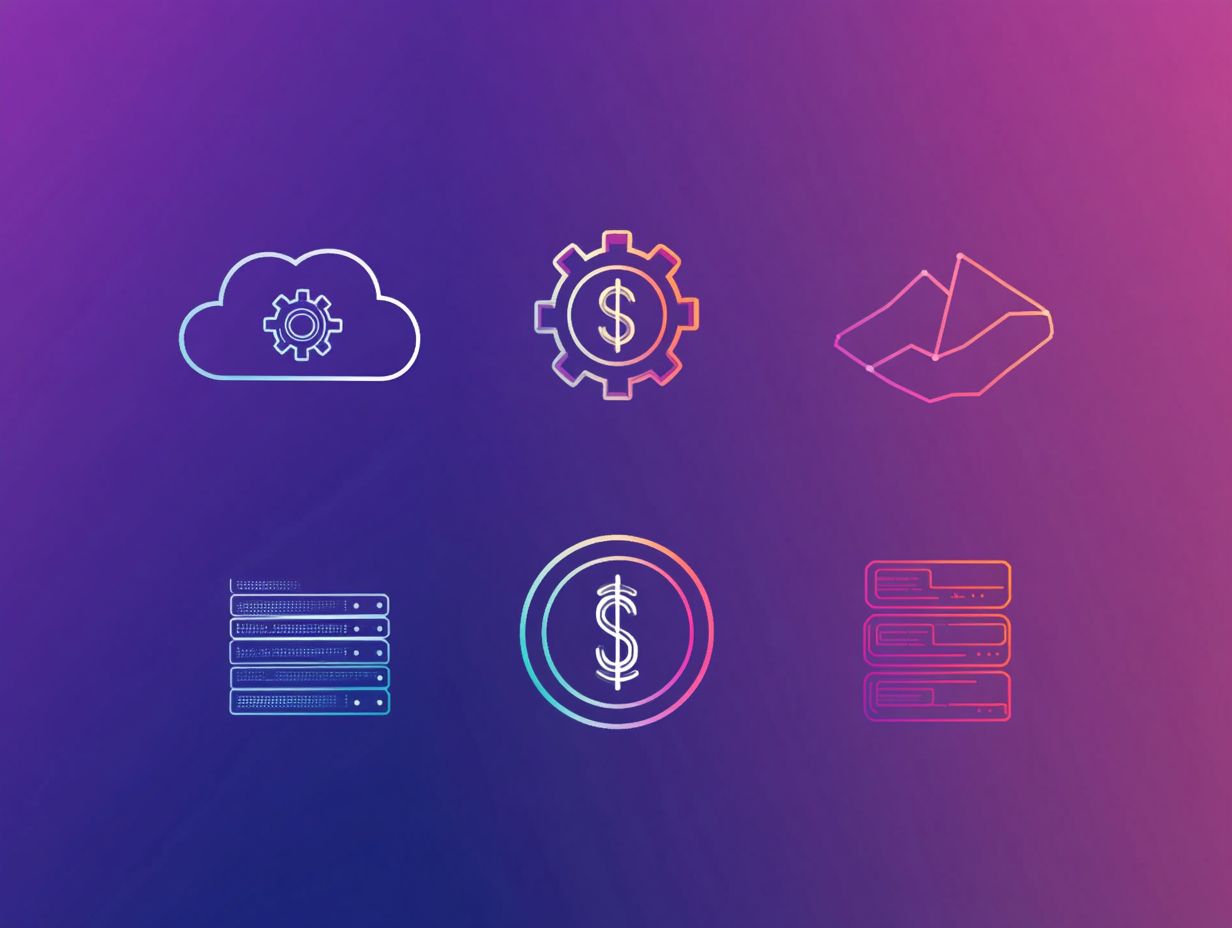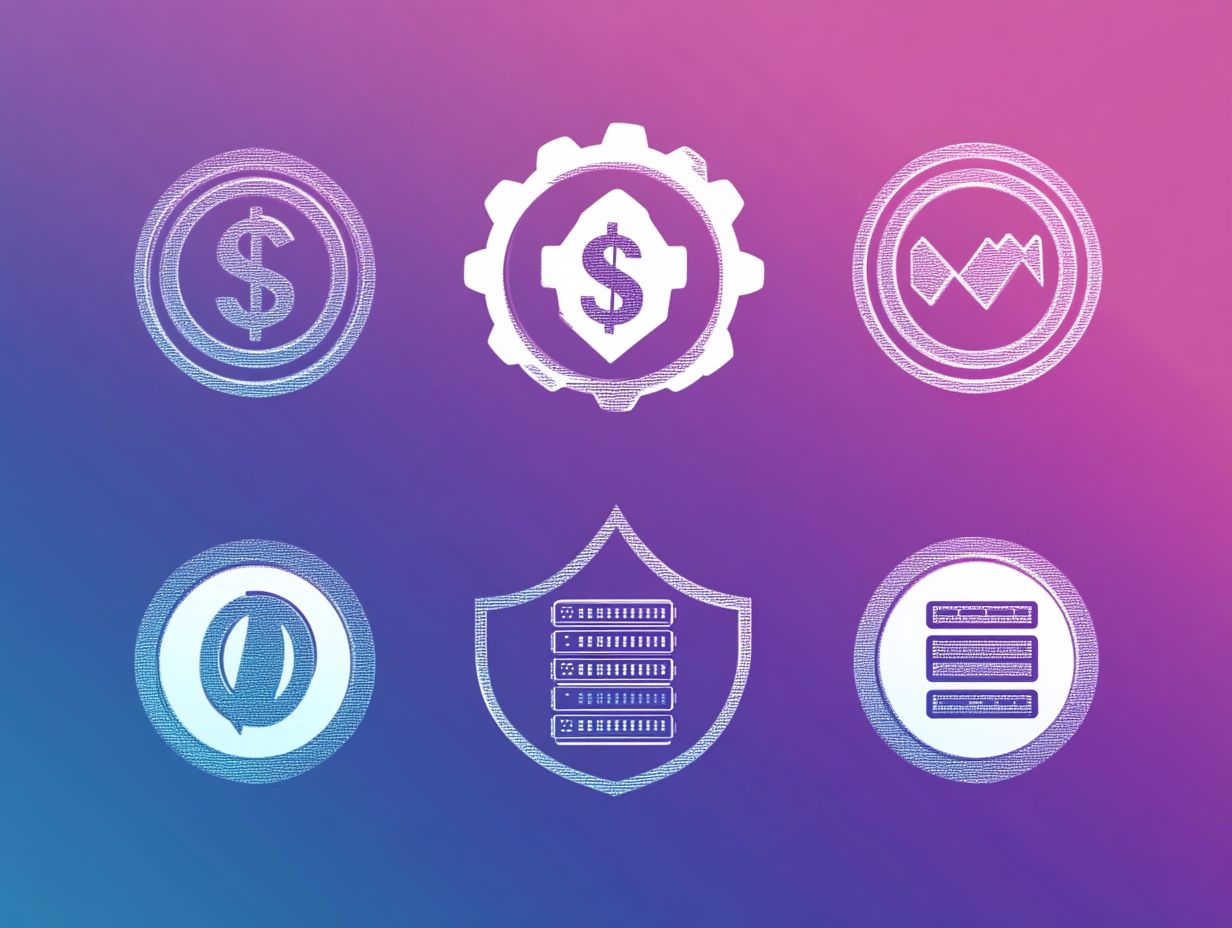5 Key Features of Modern IaaS Solutions
As you navigate the complexities of the digital landscape, Infrastructure as a Service (IaaS) is a cloud service model that provides virtualized computing resources over the internet. It stands out as a valuable solution that can elevate your business!
Get ready to discover five game-changing features of modern IaaS that can transform your business operations: scalability, flexibility, automation, cost-effectiveness, and security. You’ll also gain insights into how IaaS has evolved over time, the various types available, and the benefits it brings to organizations like yours. We’ll also discuss potential challenges and emerging trends in this technology.
Dive in to discover how IaaS can transform your business operations.
Contents
- Key Takeaways:
- 1. Scalability
- 2. Flexibility
- 3. Automation
- 4. Cost-Effectiveness
- 5. Security
- What Is IaaS and How Does It Work?
- Frequently Asked Questions
- What are the 5 key features of modern IaaS solutions?
- How does scalability play a role in modern Infrastructure as a Service (IaaS) solutions?
- Why is flexibility an important feature of modern IaaS solutions?
- How do modern IaaS solutions ensure security?
- How does automation benefit businesses using modern IaaS solutions?
- How do modern IaaS solutions help businesses save costs?
Key Takeaways:
IaaS solutions offer scalability to support business growth and changing needs without significant resource investments. The flexibility of IaaS allows businesses to customize their infrastructure to meet their specific requirements and workload demands. Additionally, incorporating must-have features in cloud storage can enhance automation in IaaS, streamlining processes, reducing human error, and improving efficiency for businesses.
1. Scalability
Scalability is at the heart of Infrastructure as a Service (IaaS), enabling you to manage resources efficiently and adapt to changing demands in real-time. In today s fast-paced cloud computing landscape, this flexibility is essential.
It allows you to expand or contract your IT infrastructure without the burden of excessive capital expenditures. This ultimately enhances operational efficiency and ensures business continuity.
Cloud providers like AWS, Microsoft Azure, and Google Cloud Platform offer an impressive array of scalable services designed to meet your specific business needs.
For example, if you’re running a retail operation that faces seasonal traffic spikes, you can leverage AWS Auto Scaling to automatically adjust your capacity, ensuring peak performance during busy shopping seasons. Likewise, as a startup, you can tap into Microsoft s Azure Virtual Machines to scale your resources effortlessly as user demand rises, eliminating downtime and boosting user experience.
These scalable solutions significantly enhance productivity by freeing your IT teams from the hassle of manual adjustments and simplifying resource management. This allows you to keep your focus where it truly matters on your core business objectives.
Harness the power of scalable IaaS solutions today to stay ahead of the competition!
2. Flexibility
Flexibility stands as a pivotal advantage of IaaS, allowing you to tailor your IT infrastructure precisely to meet your specific needs. This adaptability is crucial for supporting a hybrid work model, and you can stay ahead by keeping an eye on 5 key trends in IaaS for 2024 to accommodate remote work arrangements effectively.
Such adaptability enables you to scale resources up or down swiftly, ensuring that your organization can respond promptly to unforeseen circumstances, whether they be crises or shifting market demands.
With a diverse array of cloud service providers at your disposal, you can access tailored solutions that align perfectly with your unique business goals. This allows your teams to innovate freely, without hardware limitations.
The seamless deployment of customizable technology solutions enables your company to implement new tools and processes that significantly enhance productivity, fostering a more agile work environment capable of pivoting according to situational necessities.
3. Automation
Automation within IaaS platforms significantly simplifies your IT management processes. It enhances operational efficiency by cutting down on manual maintenance tasks and allowing for effective resource management.
By leveraging automation features, you can minimize human error and streamline workflows, leading to fewer outages and performance hiccups.
Tools like AWS CloudFormation enable you to automate infrastructure deployment, ensuring consistency and mitigating the risk of misconfiguration.
Automated testing frameworks such as Selenium integrate smoothly with cloud environments, enabling your teams to validate software functionality before it goes live.
These capabilities not only foster collaboration between development and operations but also enable your organization to respond swiftly to changing demands, ultimately enhancing your overall cloud strategy.
4. Cost-Effectiveness

Cost-effectiveness is a key advantage of Infrastructure as a Service (IaaS). It allows you to adopt a pay-as-you-go model which reduces capital expenses and lowers IT costs.
This model helps you avoid hefty upfront costs for physical servers. This is especially beneficial for startups and small businesses.
For instance, a tech startup can scale operations quickly without the burden of managing equipment. This leads to savings and better cash flow.
E-commerce companies can cut operational costs by adjusting cloud usage during peak times. This creates financial flexibility and a quick response to market changes.
5. Security
Security is crucial for organizations using IaaS. You must implement strong measures to protect sensitive data and comply with regulations.
Understanding data protection is essential in cloud computing. Many providers use advanced encryption to safeguard your information.
They often have redundant storage solutions, ensuring your data is available even during hardware failures.
For businesses using IaaS, following best practices is key. These include regular security audits, employee training, and multi-factor authentication.
What Is IaaS and How Does It Work?
Infrastructure as a Service (IaaS) is a cloud computing model that provides virtualized computing resources over the Internet. It allows you to use technology solutions like virtual machines and storage without needing physical hardware.
With IaaS, you can easily scale resources to meet demand. This keeps costs manageable while ensuring optimal performance.
Cloud providers handle the infrastructure, giving you flexible, on-demand access to resources. Major players include AWS, Microsoft Azure, and Google Cloud.
AWS offers a rich ecosystem of services. Azure integrates seamlessly with Microsoft products, while Google Cloud excels in data analytics.
How Has IaaS Evolved in Recent Years?
IaaS has transformed as businesses adopt cloud solutions for digital transformation. This shift emphasizes scalability, flexibility, and cost efficiency.
You can adjust resources dynamically to meet your needs. This frees you from traditional on-premises limitations.
Improvements like containerization and orchestration enhance service delivery. AI and machine learning also refine predictive analytics for better demand forecasting.
Today, many enterprises use IaaS to support development environments. This aligns with agile methodologies, helping them stay competitive.
What Are the Different Types of IaaS Solutions Available?

IaaS, or Infrastructure as a Service, solutions come in various forms designed to meet your specific business needs. These services include virtual machines, storage management, and networking provided by top cloud companies.
Within the IaaS framework, you’ll find offerings tailored to address operational demands, enabling you to choose solutions that align with your objectives. For a smoother transition, consider these 5 tips for migrating to IaaS.
Some providers excel in high-performance computing, perfect for businesses that require substantial computational resources for tasks like data analysis or simulations.
Others focus on scalable storage options, advantageous for organizations experiencing rapid data growth.
Major cloud providers like Amazon Web Services, Microsoft Azure, and Google Cloud Platform offer a comprehensive suite of services and pricing models, ensuring you can find a flexible and cost-effective solution for your unique workloads.
How Can Businesses Benefit from Using IaaS?
Transform your business with the power of IaaS! This approach supports business continuity, enhances operational efficiency, and streamlines disaster recovery through flexible and scalable technology solutions, including the unique features of top cloud storage providers.
By leveraging Infrastructure as a Service, your organization can quickly recover from unexpected incidents like hardware failures or cyberattacks. The on-demand resources enable rapid deployment of virtual servers, allowing you to maintain critical operations with minimal downtime.
If your business encounters an outage, you can transition to a cloud-based environment to ensure uninterrupted customer service. IaaS providers also offer strong security measures and data backups, greatly minimizing the risk of data loss.
This allows you to focus on growth and innovation instead of getting bogged down with infrastructure management concerns.
What Are the Potential Risks and Challenges of Using IaaS?
While IaaS offers many advantages, it also comes with risks and challenges. Be mindful of concerns like data breaches, monitoring difficulties, and 5 key indicators for cloud provider selection to ensure compliance requirements are met.
These vulnerabilities can expose sensitive data, leading to financial and reputational damage. Prioritizing security and compliance is crucial, especially with regulatory frameworks like GDPR or HIPAA. To safeguard your data, adopt robust security measures, including encryption and access controls.
Establishing a comprehensive monitoring system lets you detect and respond to potential threats proactively. By using automated tools and conducting regular audits, you can enhance your security posture and ensure compliance, ultimately mitigating risks associated with IaaS usage.
What Are the Future Trends in IaaS Technology?
The future of IaaS technology will be shaped by trends like the integration of big data analytics, advancements in high-performance computing, and a strong focus on security measures.
As you rely more on cloud infrastructure, these elements will enhance operational efficiency and allow you to leverage data-driven insights for strategic decision-making.
Growth in multi-cloud environments indicates a need to prioritize flexibility and interoperability across various platforms, ensuring your systems are responsive and cost-effective.
With evolving threats on the horizon, security will be paramount. Innovations like AI-driven security protocols are set to redefine protective measures, allowing your IaaS configurations to adapt to present demands and future challenges.
Frequently Asked Questions

What are the 5 key features of modern IaaS solutions?
The 5 must-know IaaS concepts include scalability, flexibility, security, automation, and cost-effectiveness. These features allow businesses to streamline operations, reduce costs, and adapt to changing needs.
How does scalability play a role in modern Infrastructure as a Service (IaaS) solutions?
Scalability is vital for modern IaaS solutions, as it lets businesses easily adjust their computing resources as needed. For startups, 5 use cases for IaaS can help them avoid paying for unused capacity.
Why is flexibility an important feature of modern IaaS solutions?
Flexibility allows businesses to select the specific services they need. This customization leads to optimized solutions without the cost of unnecessary features.
How do modern IaaS solutions ensure security?
Modern IaaS solutions provide various security measures like firewalls, encryption, and data backups. Understanding the key features of cloud solutions can help ensure that many providers also offer compliance certifications and regular security audits to keep their clients safe.
How does automation benefit businesses using modern IaaS solutions?
Automation streamlines processes and reduces human error. Businesses can manage and provision resources more easily, freeing up time for essential tasks.
How do modern IaaS solutions help businesses save costs?
With a pay-per-use model, businesses only pay for what they use. This approach eliminates costly hardware and maintenance, leading to significant savings.







